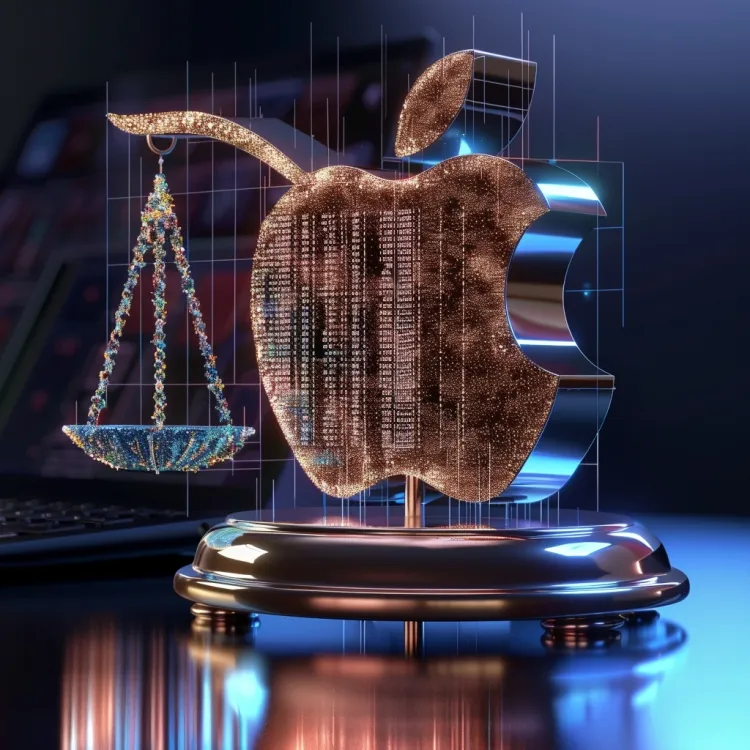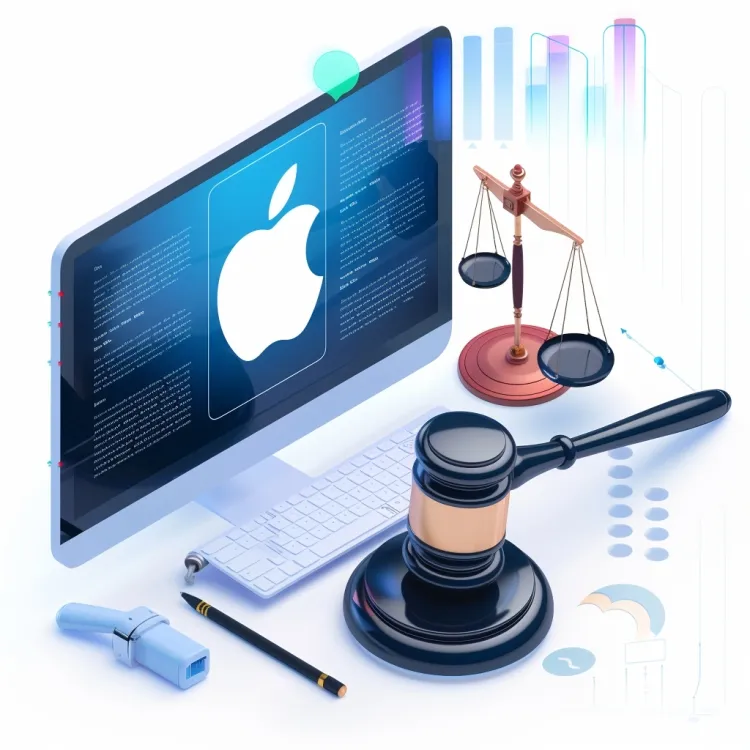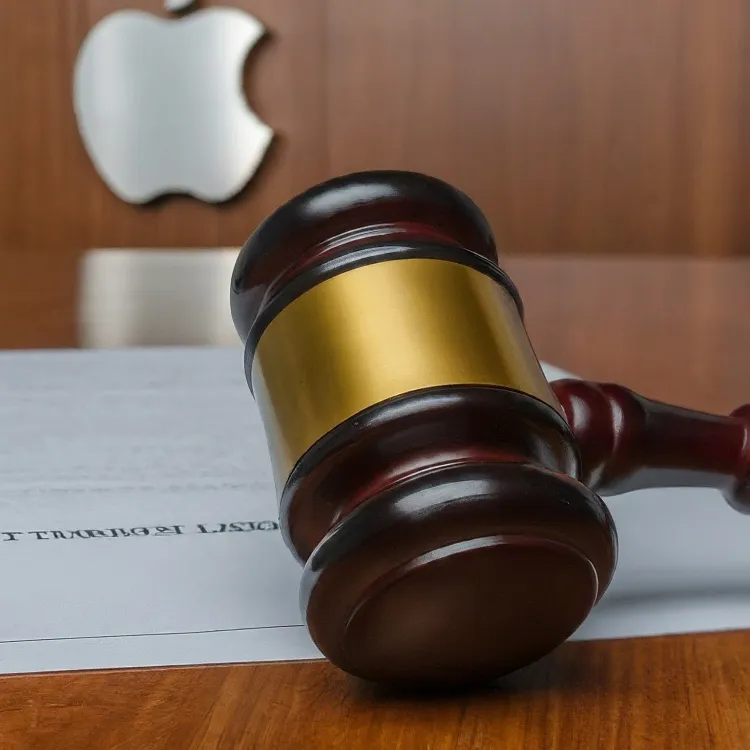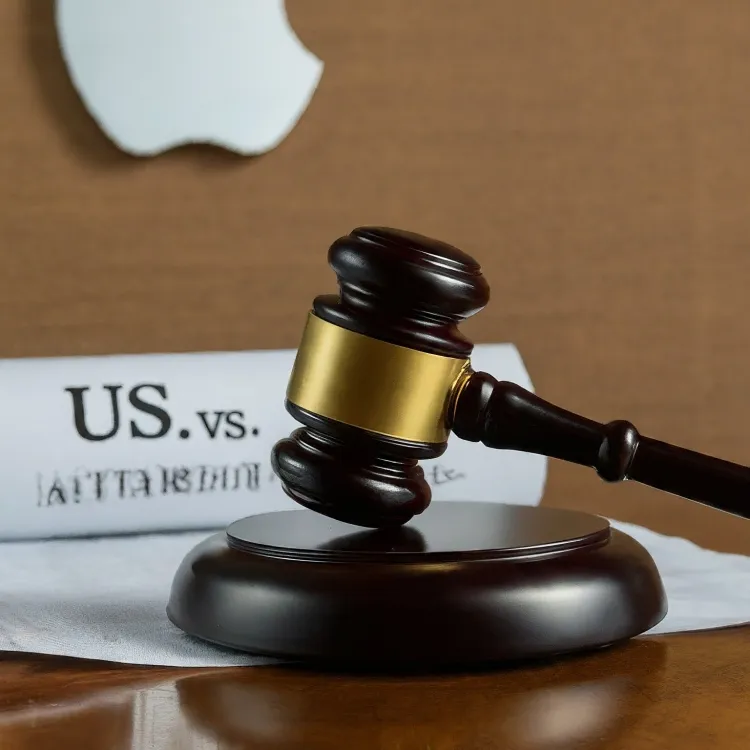Apple's Road Ahead Paved with Antitrust Hurdles After DOJ Suit
The Department of Justice's antitrust lawsuit against Apple could create years of Courtroom Wars. Legal experts say the federal case will likely drag on for a long time.

Table of Content
- 1. Justice Department takes aim at App Store policies
- 2. Epic Games lawsuit looms in the background
- 3. Regulatory scrutiny around the world
- 4. Apple's Walled garden under fire
- 5. Calls for alternative app stores
- 6. App developers cry foul over fees
- 7. Privacy changes could also draw scrutiny
- 8. Years of uncertainly ahead
- 9. Apple's dominance faces challenges
- 10. Is Big Tech too powerful?
Apple is now facing the prospect of years of distracting legal wrangling after the US Department of Justice filed an antitrust lawsuit against the company on Tuesday.
The U.S. Justice Department filed an antitrust lawsuit against Apple today, accusing the company of abusing its control over the App Store. In a legal complaint filed in federal court, the DOJ alleges that Apple is unfairly favoring its own apps and discriminating against competing streaming music services like Spotify. The suit is the highest-profile antitrust enforcement action against Apple in years and threatens to distract the company from other priorities as it works to defend its business model in a prolonged legal battle.
1. Justice Department takes aim at App Store policies
1.1 Commission fees in the crosshairs
The DOJ argued that Apple's 30% commission on in-app purchases and subscriptions is anti-competitive. The lawsuit claims these fees result in higher prices for consumers and make it difficult for competitors to enter the market. Apple countered that its fees are standard in the industry and help fund critical services for app developers.
1.2 Restrictions on third-party app stores targeted
A key focus of the DOJ's complaint was Apple's policies prohibiting the distribution of iOS apps outside the App Store. The DOJ claims these restrictions demonstrate Apple's monopoly power over the distribution of iOS apps and prevent competitors from offering alternative app stores on iOS devices.
1.3 Sherlocking behavior challenged
The DOJ also took issue with what it referred to as Apple's "sherlocking" behavior, in which Apple identifies key features of third-party apps and integrates similar functionality into its own software updates. The DOJ argues this behavior discourages innovation from app developers and undermines competition. Apple denies anticompetitive intent, saying it aims to improve its products based on customer feedback.
1.4 Long legal battle ahead
The DOJ's lawsuit is likely to spawn a protracted legal battle that could drag on for years and ultimately end up in the Supreme Court. As with the DOJ's case against Microsoft in the 1990s, a resolution may be several years away, creating uncertainty for Apple and the broader tech sector. Apple vowed to vigorously defend its App Store business practices, setting the stage for a high-profile showdown with major implications.
1.5 Pressure from developers and regulators mounts
The DOJ's lawsuit adds to the pressure Apple already faces from app developers and regulators globally. Developers have long voiced concerns over Apple's fees and policies, while regulators in the EU and elsewhere are also scrutinizing Apple for potential antitrust violations. Apple must now fight legal challenges on multiple fronts, raising the prospect of forced changes to its business model.
2. Epic Games lawsuit looms in the background
While the DOJ's antitrust lawsuit will likely drag on for years and prove distracting, an even bigger threat looms on the horizon for Apple in the form of Epic Games' own antitrust claims. Epic, maker of the popular Fortnite game, is suing Apple over its App Store policies and commission structure, arguing that Apple's rules around in-app purchases and its 30% cut of sales are anti-competitive.
Epic's lawsuit is set to go to trial in 2022 and has the potential to force major changes to the App Store's rules. A ruling against Apple could force the company to allow third-party app stores and payment systems, threatening a major source of revenue and control for the company. The outcome of Epic v. Apple may determine whether the walled garden of iOS remains standing or comes crumbling down, opening the platform up to new competition and business models. More detail on the Epic lawsuit and its implications is below.
|
Fortnite maker Epic Games is suing Apple for removing Fortnite from the App Store. |
The Epic Games case focuses on Apple's control over its App Store and in-app payment system. Epic wants to offer its own payment option in the Fortnite app to avoid paying Apple's commission. But Apple requires developers to use its payment system and pay the commission for all digital goods and services sold within apps. Epic argues this policy is monopolistic. Apple counters that its commission is fair compensation for providing a secure platform and payment service. |
| The outcome of the Epic lawsuit could significantly impact Apple's services revenue, which rose 16% last year to $54 billion and has become an increasingly important business for the company. If Apple lost the case, it might have to allow alternate payment options and lower its commission rate to appease developers and regulators. However, Apple would likely appeal any unfavorable ruling, and the case could be tied up in the courts for years before a final resolution. | The Epic lawsuit also threatens to further tarnish Apple's reputation at a time when the company is facing increased antitrust scrutiny. Apple has already been under investigation by multiple regulators in the U.S. and European Union for potential anti-competitive practices in its App Store. A high-profile public lawsuit from Epic Games puts more pressure on Apple and spotlights some of the biggest complaints from developers about the App Store. |
|
The Epic Games case highlights growing tensions between developers and tech platforms. Developers have become increasingly frustrated with the control that companies like Apple and Google exert over their app stores and the money they make from digital sales. At the same time, platforms argue their commission rates are fair and help provide resources to support developers. This conflict will likely heat up in the coming years. |
3. Regulatory scrutiny around the world
Apple's legal troubles are just beginning. The U.S. Department of Justice's antitrust lawsuit alleging anti-competitive behavior in the company's App Store is likely the first of many regulatory actions Apple will face in the coming years. Authorities around the globe are increasing scrutinizing big tech companies and their market power.
Apple can expect antitrust investigations in the European Union, where regulators have already targeted Apple's App Store rules and the mandatory use of its proprietary in-app purchase system that charges a 30% commission. Apple may face similar antitrust lawsuits in the E.U. with potential multi-billion dollar fines. Regulators in Australia, Japan, South Korea, and other nations are also closely watching Apple and could open their own antitrust probes.
All of these regulatory actions and the uncertainty they bring threaten to distract Apple's leadership for years to come at a critical time for the company. More detail on additional scrutiny from regulators around the world follows below:
3.1 European Commission investigation
The European Commission has been investigating Apple's App Store practices for potential antitrust violations. The investigation is examining whether Apple's rules for app developers violate EU competition law. Specifically, the Commission is looking into whether the mandatory use of Apple's in-app purchase system and restrictions on developers informing users of alternative purchasing options are anti-competitive. A formal antitrust charge could lead to major changes in how Apple operates the App Store in Europe.
3.2 New legislation threatens App Store model
Proposed legislation like the Open App Markets Act could force Apple to allow third-party app stores and alternative in-app payment systems on iOS. If passed, the law would require Apple to loosen restrictions that currently tie developers and consumers to Apple's services. Allowing additional app stores and payment systems could significantly reduce Apple's control over the iOS ecosystem and cut into App Store profits.
3.3 App Store changes in response to developer backlash
Facing increasing criticism from developers over App Store policies and fees, Apple has made some concessions to appease its developer community. However, the changes so far have been modest, including a small decrease in App Store commissions for some developers. More substantial changes, like a meaningful drop in the standard 30% commission, alternative payment systems, or loosening of restrictions on communications with customers, are unlikely without intervention from regulators or new legislation.
3.4 Global push for mobile payment reform
There is a broader global movement to expand competition in digital payments and reduce the market power of big tech platforms. Regulators around the world are examining policies to open up platforms like iOS to alternative payment providers. Requiring platforms to provide more choice and transparency in payments could significantly impact Apple's Services business, which relies heavily on the fees and data collected from in-app purchases and subscriptions. However, technology platforms argue more open payment policies could compromise security and privacy.
3.5 App Store under scrutiny in India
India's competition regulator, the Competition Commission of India (CCI), is investigating Apple's App Store rules and fees in India following a complaint from a local non-profit. The investigation is looking at whether Apple's 30% commission on in-app purchases and strict control over the iOS ecosystem violate India's antitrust laws. The CCI's inquiry is part of a broader effort to curb alleged anti-competitive behavior by big tech companies. A negative finding could lead to fines and orders to change App Store policies in India.

4. Apple's Walled garden under fire
Apple is facing intense scrutiny over its tightly controlled iOS mobile operating system and App Store, often referred to as its \u201cwalled garden.\u201d The Department of Justice antitrust lawsuit alleges that Apple's restrictions on apps and payments amount to anti-competitive behavior that harms consumers and app developers. At the heart of the allegations is Apple's requirement that all iOS apps be distributed through its App Store, where Apple takes a 15-30% cut of all revenue, and its prohibition of alternative payment systems within apps.
4.1 Restricting third-party apps and services
Apple's control over its ecosystem through its App Store has drawn criticism. The company takes a cut of in-app purchases and subscriptions, and it can restrict or ban apps at will. The DOJ argues this level of control harms competition and consumers. Apple will likely face pressures to open up its platform more to third parties.
4.2 Scrutiny of App Store policies and fees
The App Store is a major source of revenue for Apple, but its policies and fees have been controversial. The DOJ suit specifically calls out Apple's prohibition of alternative app stores and payment methods as anti-competitive. Apple may need to revisit its App Store fees and rules to satisfy regulators and lawmakers.
4.3 Calls for interoperability and sideloading
There have been demands that Apple allow users to install apps from third-party sources, known as "sideloading." The company argues sideloading would compromise security and privacy. But regulators see openness as pro-competition. Apple will face difficulties balancing security concerns with demands for interoperability and choice.
4.4 Loss of control over APIs and system access
Apple closely guards access to its platforms to optimize performance, security, and user experience. But selectively allowing some apps access to system resources and not others has raised fair competition concerns. If forced to open APIs and access, Apple would lose control and oversight over how third parties leverage and potentially abuse platform capabilities.
4.5 Difficulty attracting and retaining top talent
The prolonged legal battle and internal debates on balancing openness with control could prove distracting for Apple's leadership. And highly sought software engineers and designers value the ability to build innovative products without undue constraints. If Apple loses its ability to closely integrate hardware, software, and services, it risks compromising its ability to attract top tech talent.
4.6 Need to redefine Apple's brand identity
Apple's brand is tied to notions of design, privacy, seamlessness, and control. Greater openness could undermine these brand pillars, forcing Apple to rethink its brand positioning. It needs to craft a compelling vision of a more open Apple that still delivers the security, design, and cohesion customers expect. Failing at this risks confusing or alienating loyal customers.
5. Calls for alternative app stores

Calls for alternative app stores on iOS devices have increased since the DOJ lawsuit was announced.
Currently, Apple's App Store is the only official way for iPhone and iPad users to download apps. Allowing third-party app stores could open up more opportunities for developers and increase competition, but it may come with risks to security and privacy.
5.1 Epic Games Store and other competitors
Epic Games has launched its own PC games store to compete with Steam, and it's possible Epic or other companies could try to launch competitor app stores on iOS. However, Apple's tight control of iOS and the App Store ecosystem would make this very difficult. Epic Games is already in a legal battle with Apple over Fortnite's removal from the App Store.
5.2 Allowing third-party app stores
If Apple were forced to allow third-party app stores on iOS, it could significantly impact Apple's business model and branding. However, it may benefit consumers by providing more choice and competition. There are arguments on both sides, and it's a complex issue with no easy answer.
5.3 Loss of control and security risks
Allowing third-party app stores could compromise the security and privacy of iOS, as Apple would have less control over apps distributed through other stores. Malware, privacy violations, and other issues become more likely when there are multiple app stores with different standards and levels of review. However, others argue that open platforms like Android face similar risks, and users can still take precautions.
5.4 Impact on iOS app developer's business
For iOS developers, third-party app stores could be a double-edged sword. On the one hand, more app stores means more opportunities to distribute apps. But it also means developers have to submit to multiple different review processes and pay more commissions to different store owners. The current system, with one App Store and one set of rules, is simpler for most developers.
5.5 Apple may loosen restrictions over time
Even without a legal ruling, Apple may choose to loosen some App Store restrictions over time in response to developer and consumer complaints. For example, Apple could lower its 30% commission, allow for alternative payment systems, or provide other features like trial periods or price matching. While major changes are unlikely, some incremental steps toward a more open iOS software distribution system are possible.
6. App developers cry foul over fees
App developers have long complained about the 30% commission Apple charges on in-app purchases and subscriptions made through apps on its iOS mobile operating system. The fees generated $15.9 billion in the last fiscal year for Apple, making its lucrative App Store the focus of government antitrust scrutiny and a lawsuit filed this week by the U.S. Justice Department. Epic Games, maker of the popular Fortnite game, is also suing Apple over the fees and policies that some developers argue amount to monopolistic behavior.
6.1 Loss of innovative competitive advantage
Apple's 30% commission on in-app purchases and subscriptions has long been a sore point for developers, who argue the fees stifle innovation by raising costs for consumers and reducing their own revenue and profit margins. Some developers say the policy has made it difficult to compete with Apple's own apps and services on the App Store.
6.2 Class-action lawsuit intensifies pressure
A class-action lawsuit filed by a coalition of developers seeks to force Apple to lower its App Store fees and make them more flexible based on the type of app or service. The lawsuit argues Apple's policies violate antitrust laws by forcing developers into an "oppressive" contract with rigid terms and fees far above the costs of running the App Store.
6.3 European regulators examine anticompetitive behavior
Regulators in Europe have also taken aim at Apple's App Store fees, with investigations underway in both the EU and the UK into whether the policies represent anticompetitive behavior. Preliminary findings from an EU probe suggest Apple's policies limit choice for both developers and consumers. Some developers argue regulation is needed to open iOS to third-party app stores and payment systems.
6.4 Alternative app stores could reduce Apple's control
If regulators forced Apple to allow third-party app stores and payment systems on iOS, developers would likely flock to alternatives that charge lower fees. Some estimates indicate Apple could lose billions in revenue if its App Store dominance was disrupted. However, Apple argues its App Store curation and fees help ensure quality, security and privacy standards that would be difficult for alternative stores to match.
6.5 Fee changes unlikely to significantly impact stock
Despite the regulatory and legal challenges, most analysts don't expect major changes to Apple's App Store fees or policies. And even if Apple were forced to lower fees or open up iOS to alternatives, the impacts on Apple's services revenue and stock price would likely be minimal. At most, analysts estimate Apple could lose 5-10% of its services revenue, equal to about 1% of its total revenue.
7. Privacy changes could also draw scrutiny
Apple's recently announced privacy changes allowing users to opt out of targeted advertising could also invite regulatory scrutiny over competition concerns. The company said its new App Tracking Transparency feature, launching later this year, will require apps to get a user's permission before tracking their data and sharing it for advertising purposes. However, critics argue this could disadvantage competing advertisers like Facebook that rely heavily on such data for their ad targeting systems.
7.1 Collection and use of consumer data
Apple collects and uses customer data to improve its products and services. However, Apple's data collection practices have come under increased scrutiny. Regulators and privacy advocates argue thatApple should be more transparent about how it collects and shares customer data. Apple may need to re-examine its privacy policies and data use practices to avoid additional legal challenges in the future.
7.2 Location tracking concerns
Apple uses location data to provide services like Maps, but this location tracking has raised privacy concerns. Regulators have questioned whether Apple provides customers with enough information and control over their location data. Apple may need to provide customers with more transparency and options to disable location tracking for certain apps and services. This could impact the functionality of some apps but would help address privacy concerns.
7.3 Encryption and law enforcement access
Apple has implemented stronger encryption on its devices and services, but law enforcement agencies argue this hampers their investigations. There are calls for Apple to provide "backdoors" to encryption that would give law enforcement access to data. However, privacy experts argue this could compromise security and set a dangerous precedent. Apple will need to navigate conflicting demands from privacy advocates and law enforcement on this complex issue.
7.4 International privacy laws
New privacy laws like the GDPR in Europe and laws in Brazil and India place more restrictions on how companies collect and use personal data. Apple will need to continue updating its policies and systems to comply with privacy laws in different countries and regions. Failure to do so could result in major financial penalties and further legal troubles.
7.5 Ad tracking prevention features
Apple has introduced new features like Intelligent Tracking Prevention that limit how advertisers and websites track users. However, these moves face opposition from digital advertisers and publishers who claim they threaten the online ad industry's business model. There are calls for regulators to examine whether Apple's ad tracking prevention features are anti-competitive. Apple will need to defend these pro-privacy features to avoid additional antitrust scrutiny.
8. Years of uncertainly ahead

Apple faces years of uncertainly ahead. The lawsuit filed by the Department of Justice accusing Apple of running an illegal monopoly with its App Store spells trouble for the company that once prided itself on simplicity and focus.
Now, instead of improving its products and services, executives and lawyers in Cupertino will be distracted by years of complex legal wrangling. They'll fight back against the regulators in court and through PR campaigns, which are likely to become nasty and personal. Regardless of the outcome, Apple's brand may take a hit. Investors and partners will grow jittery. Questions will arise about how open Apple's platforms should be and about what kind of company it wants to be. The only sure thing is that the next few years won't be business as usual for Apple.
8.1 Legal battles and appeals
The DOJ antitrust lawsuit is likely to drag on for years through various appeals and legal proceedings. Apple will have to continue allocating resources to fight the case, which could prove distracting for executives and employees. The appeals process could take 3-5 years based on the timelines of other major antitrust cases. During this time, Apple's actions will be closely scrutinized, and any missteps could be used against them in court.
8.2 Increased government scrutiny
Regulators around the world may increase their oversight of Apple's business practices and potentially open other antitrust investigations. Government officials will be watching for any signs of anti-competitive behavior, especially related to the App Store and Apple's services. Apple will have to be extremely careful to avoid additional legal trouble during this time. Increased scrutiny could also lead to new regulations that impact how Apple operates its platforms and services.
8.3 Pressure from developers
Developers will likely increase pressure on Apple to loosen App Store restrictions and lower its commission rates following the lawsuit. Some developers may file their own legal challenges or complaints against Apple's policies. The lawsuit gives more credibility to longstanding developer grievances against Apple, and developers will push harder to force changes while Apple is in a vulnerable position. Apple will have to determine how to balance the demands of developers with its own business interests.
8.4 Reputational damage
The antitrust lawsuit could damage Apple's reputation among consumers, investors, and regulators. While Apple still maintains a largely positive brand image, the case could frame the company as unfair or anti-competitive in the minds of some. Negative publicity from the lawsuit may hurt Apple's standing as a pro-consumer and pro-privacy company. Reputational damage is difficult to quantify but threatens to undercut the trust and goodwill Apple has built up over the years.
8.5 Distracted leadership
Apple's senior executives, especially CEO Tim Cook, will have their attention diverted by the challenges of the antitrust case. Instead of focusing on innovation and growth, leadership will be preoccupied with mitigating legal and regulatory issues. The long duration of appeals also risks the case dragging on through changes in leadership, with new executives taking time to get up to speed. For a company like Apple, having distracted or transitioning leadership for so long could significantly impact its business.
9. Apple's dominance faces challenges
Apple's dominance of the technology industry has propelled its rise as the world's most valuable company, but its perch atop the mountain now faces significant challenges. The U.S. Department of Justice's antitrust lawsuit alleging that Apple has abused its market power in the App Store is the most direct threat. If the case proceeds to trial and the government prevails, it could force Apple to change its App Store policies and loosen its grip over developers.
9.1 iPhone growth slowing down
Apple's iPhone revenue grew by only 2% year over year in the December quarter, continuing a trend of slowing growth for the company's flagship product. The smartphone market is mature, and most people already own iPhones, limiting Apple's opportunities for expansion. The company will need new products and services to drive growth as iPhone sales plateau.
9.2 Antitrust scrutiny increasing
Regulators around the world are investigating Apple for potential antitrust violations related to its App Store and other services. The U.S. Department of Justice recently filed an antitrust lawsuit alleging that Apple uses its power over the App Store to unfairly disadvantage competitors. The EU and other regions are conducting their own probes into Apple's business practices. Antitrust actions could force changes at Apple and distract management.
9.3 New competitors emerging
Companies like Samsung, Google, and Huawei are producing innovative new smartphones, smart speakers, and other devices that compete with Apple products. Some of these competitors are gaining market share, especially in emerging markets where Apple has struggled. While Apple still leads in brand appeal and premium devices, competitors are posing a bigger threat. Apple will need to keep improving its products and services to stay ahead of tough competition.
9.4 Over-reliance on China
Apple relies heavily on Chinese manufacturing and consumers, leaving it exposed to risks. Trade tensions could drive up costs or limit production. China's economy could slow down, reducing demand for iPhones and other premium Apple products. And competitors like Huawei, Oppo, and Xiaomi dominate China's smartphone market, limiting Apple's sales in this critical region. Apple needs to diversify its supply chain and customer base to reduce dependence on China.
9.5 Services growth needed
While device sales are slowing, Apple's services business is booming. Services like Apple Music, iCloud, and Apple Pay are driving revenue and profit growth. But Apple still relies on device sales for over 60% of its revenue, indicating it has more work to do in building its services ecosystem. Apple should continue expanding its roster of services and developing new offerings to generate more balanced and sustainable growth. Services success will help offset device sales headwinds.
10. Is Big Tech too powerful?
The largest technology companies have amassed unprecedented amounts of data, wealth, and influence over the past decade. Now regulators around the world are questioning whether Big Tech has become too powerful.
Major tech companies like Apple, Amazon, Alphabet's Google, and Facebook now dominate entire markets and boast valuations in the hundreds of billions of dollars. They wield tremendous power over how we communicate, shop, get information, and more. Yet their rise has been largely unchecked, allowing them to gobble up startups, acquire data at a massive scale, and set the rules for entire industries.
There are growing concerns that Big Tech's power has spiraled out of control and needs to be reined in. Critics argue the companies abuse their power and stifle innovation. Defenders counter that regulation could hamper progress and the services Big Tech provides. There are no easy answers, but with antitrust lawsuits mounting, data privacy legislation looming, and public trust in technology companies eroding, Big Tech faces years of scrutiny and uncertainty ahead. More details on the key issues in the debate follow below.
10.1 Market dominance and competition
Tech giants like Apple, Amazon, Facebook and Google have amassed huge amounts of data and market power. They dominate markets and crush competitors, raising concerns about reduced competition and innovation. There have been calls to break up these companies to promote competition. However, others argue that their large size also provides efficiencies of scale and benefits to consumers. There are complex trade-offs to consider around market dominance and competition in the tech industry.
10.2 Privacy and data concerns
The huge amounts of personal data collected by big tech companies have raised major privacy concerns. There are worries about how the data is collected, stored, used and shared. Regulations like GDPR have placed some restrictions on how companies can use people's data but critics argue they don't go far enough. There are calls for individuals to have more control and ownership over their own data. However, others think some data sharing also provides benefits to consumers and fuels innovation. There are complex debates around finding the right balance on privacy, data use and innovation.
10.3 Market distortions
The enormous size and power of big tech companies could potentially distort markets in harmful ways. There are concerns they abuse their power through anti-competitive practices like giving preference to their own services, acquiring competitors to kill competition, or forcing unfair terms on businesses that rely on their platforms. However, others argue their large scale also provides significant benefits and efficiencies. There are important discussions around preventing market distortions while still enabling innovation.
10.4 Responsibilities and governance
As big tech companies gain more influence and control, there are questions about how they should be governed and regulated. Self-regulation has largely failed, but government regulation also raises issues. There are calls for companies to take more responsibility over harms like the spread of misinformation or extremism on their platforms. But others worry too much control could infringe on free speech and expression. There are complex trade-offs between governance, responsibility, regulation and freedom of expression in the tech industry.
10.5 Employee issues
Big tech companies have been accused of various employee issues like poor working conditions, lack of job security, anti-competitive practices and lack of diversity. There have been numerous reports of harsh working conditions for contractors, abuse of non-compete clauses, lack of gender and racial diversity and various other issues. Companies have pledged to improve in some of these areas but critics argue more needs to be done. There are debates around how to balance the interests of employees, companies, shareholders and customers.
Apple will likely face years of distraction and uncertainty as a result of the DOJ's antitrust lawsuit. While the case works its way through the legal system, Apple's senior executives will have to devote significant time and resources to managing the suit. There is also a chance the final ruling requires changes to App Store policies or fees that could impact Apple's services revenue and profit margins.
More broadly, the DOJ's action highlights the intensifying scrutiny of big tech companies and their market power. Apple now joins Google, Facebook, and others in facing an existential threat to its business model and power. Regulators and politicians around the globe are questioning whether companies have become too dominant in certain sectors of the digital economy. There are calls to impose new restrictions on acquisitions, data collection, and self-preferencing practices.
Apple believes its App Store policies benefit both consumers and developers by providing security, privacy, and quality standards. However, if the tide of public and regulatory opinion turns decisively against the tech giants, Apple may have to make concessions to placate concerns about fair competition and market dominance. The company prides itself on closely integrating hardware, software, and services to deliver a seamless user experience. But elements of that integration, like default apps and App Store rules, are attracting the most criticism for being anti-competitive.
While the DOJ's case could take years to conclude, it highlights the array of challenges Apple faces in the coming decade. A company long used to setting the agenda in product categories it invents must now react to forces outside its control. How Apple responds to and preempts further legal and regulatory actions against it may determine whether it can sustain the remarkable success it has achieved over the past 15 years. The tech landscape is shifting, and the next chapter of Apple's story remains unwritten. Its ability to adapt to the new power dynamics with regulators, developers, and customers will shape its future as much as any new product
What's Your Reaction?




















